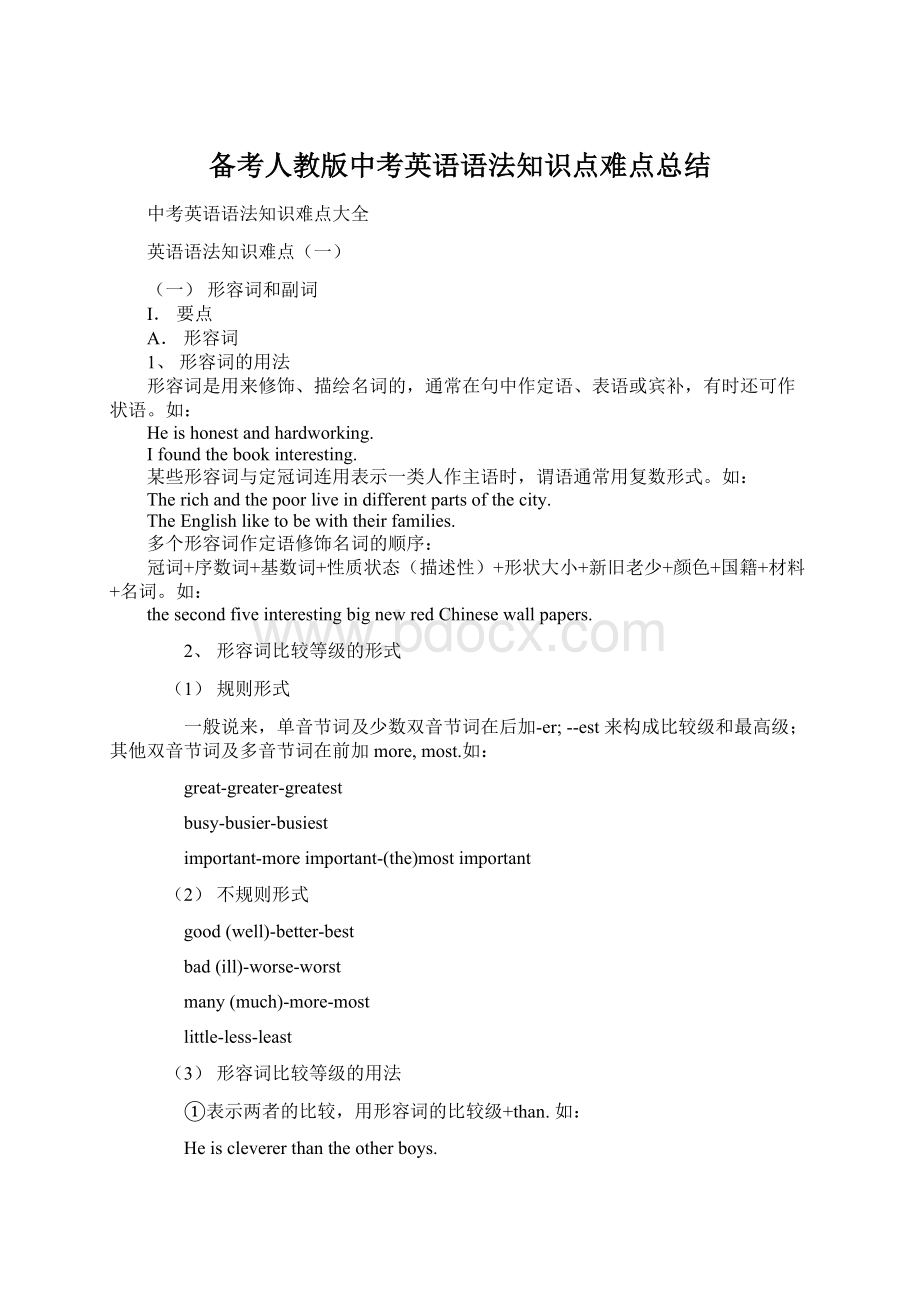 备考人教版中考英语语法知识点难点总结文档格式.docx
备考人教版中考英语语法知识点难点总结文档格式.docx
- 文档编号:16363094
- 上传时间:2022-11-23
- 格式:DOCX
- 页数:34
- 大小:41.40KB
备考人教版中考英语语法知识点难点总结文档格式.docx
《备考人教版中考英语语法知识点难点总结文档格式.docx》由会员分享,可在线阅读,更多相关《备考人教版中考英语语法知识点难点总结文档格式.docx(34页珍藏版)》请在冰豆网上搜索。

③表示两者是同等程度,用"
as+形容词原级+as"
.如:
HeisastallasI.
Ihaveasmanybooksasyou.
④越…越…
例如:
ThemoreIlearn,thehappierIam.
⑤Youcanneverbetoocareful.越小心越好
又如:
Youcanneverpraisetheteachertoohighly.
你怎么赞扬这个老师也不过分。
⑥Ihaveneverspentamoreworryingday.
那一天是最令我担心的一天。
Ihaveneverhadabetterdinner.
这是我吃过的最好的一顿饭。
⑦MyEnglishisnobetterthanyours.
我的英语和你的英语都不怎么样。
B.副词
1、副词的种类
(1)时间副词如:
ago,before,already,just,now,early,late,finally,tomorrow等
(2)地点副词如:
here,there,near,around,in,out,up,down,back,away,outside等。
(3)方式副词如:
carefully,angrily,badly,calmly,loudly,quickly,politely,nervously等。
(4)程度副词如:
almost,nearly,much,greatly,abit,alittle,hardly,so,very等。
2、副词比较等级的用法
其用法与形容词相似,只是副词最高级前可省略定冠词。
Ofalltheboyshesings(the)mostbeautifully.
Wemustworkharder.
3、某些副词在用法上的区别
(1)already,yet,still
already表示某事物已经发生,主要用于肯定句;
yet表示期待某事发生,主要用于否定句和疑问句;
still表示某事还在进行,主要用于肯定句和疑问句,有时也可用于否定句。
We'
vealreadywatchedthatfilm.
Ihaven'
tfinishedmyhomeworkyet.
Hestillworksuntillateeverynight.
(2)too,aswell,also,either
too,aswell和also用于肯定句和疑问句,too和aswell多用于口语,一般放在句末,而also多用于书面语,一般放在句中与动词连用。
either用于否定句和否定的疑问句,往往放在句末。
Hewenttheretoo.
Hedidn'
tgothereeither.
Ilikeyouaswell.
Ialsowentthere.
(3)hard,hardly
hardly意为"
几乎"
与hard在词义上完全不同。
Iworkhardeveryday.
Icanhardlyrememberthat.
(4)late,lately
lately意为"
最近、近来"
,late意为"
晚、迟"
。
Henevercomeslate.
Haveyoubeentothemuseumlately?
II.例题
例1Tom'
sfatherthinksheisalready____
Ahighenough Btallenough
Cenoughhigh Cenoughtall
解析:
该题正确答案是B。
修饰人高用tall,而建筑物的高用high,并且enough修饰形容词要放在形容词后面。
因此该题选B。
例2____theworseIseemtobe.
AWhenItakemoremedicine
BThemoremedicineItake
CTakingmoreofthemedicine
DMoremedicinetaken
该题正确答案为B。
"
the+形容词比较级+…,the+形容词比较级+…"
意为越…,越…。
该句意为:
吃的药越多,我的病越是加重。
例3"
Ihaven'
tbeentoLondonyet"
.
"
tbeenthere____"
Atoo Balso Ceither Dneither
该题正确答案为C。
A和B都用于肯定句中。
D-neither本身意为否定"
两者都不"
,而C-either则用于否定句中,意为"
也"
例4MrSmithwas____movedatthenews.
Adeep Bdeeply Cverydeep Dquitedeeply
A.deep用于副词时,修饰具体的深,如digdeep,而B-deeply则修饰表示感情色彩的词,如该题为deeplymoved.另如deeplyregret等。
而D-quite和deeply均为副词,不能互相修饰。
(二)介词
I.要点
1、介词和种类
(1)简单介词,常用的有at,in,on,about,across,before,beside,for,to,without等。
(2)复合介词,如bymeansof,alongwith,becauseof,infrontof,insteadof等。
2、介词和其他词类的习惯搭配关系
(1)和动词的搭配,如agreewith,askfor,belongto,breakawayfrom,careabout等。
(2)和形容词的搭配,如afraidof,angrywith,differentfrom,goodat
(3)和名词的搭配,如answerto,keyto,reasonfor,causeof,visitto等.
3、介词短语可以有自己的修饰语,这种修饰语通常有right,just,badly,all,well,directly,completely等少数几个副词。
Hecamerightafterdinner.
Helivesdirectlyoppositetheschool.
4、某些介词的意义与用法举例
(1)at,on,in(表时间)
表示时间点用at,如atfouro'
clock,atmidnight等;
表示不确定的时间或短期假日也用at,如atthattime,atChristmas等。
指某天用on,如onMonday,ontheendofNovember,指某天的朝夕用on,如onFridaymorning,ontheafternoonofSeptemberlst等。
指长于或短于一天的时段用in,如intheafternoon,inFebruary,inSummer,in1999等。
(2)between,among(表位置)
between仅用于二者之间,但说三者或三者以上中的每两个之间的相互关系时,也用between,如
I'
msittingbetweenTomandAlice.
Thevillageliesbetweenthreehills.
among用于三者或三者以上之间。
Heisthebestamongthestudents.
(3)beside,besides
beside意为"
在…旁边"
,而besides意为"
除…之外"
Hesatbesideme.
Whatdoyouwantbesidesthis?
(4)inthetree,onthetree
inthetree指动物或人在树上,而onthetree指果实、树叶长在树上
(5)ontheway,intheway,bytheway,inthisway
ontheway指在路上intheway指挡道
bytheway指顺便问一句inthisway用这样的方法
(6)inthecorner,atthecorner
inthecorner指在拐角内atthecorner指在拐角外
(7)inthemorning,onthemorning
inthemorning是一般说法onthemorning特指某一天的早晨
(8)bybus,onthebus
bybus是一般说法onthebus特指乘某一辆.
II.例题
例1Doyouknowanyotherforeignlanguage____English?
AexceptBbutCbesideDbesides
A、B两项except等于but,意为"
除了…"
,C-beside意为"
,不符合题意。
而D-besides, 意为"
除了…之外,还有"
所以该题正确答案为D。
该题意为:
除了英语外,你还知道别的语言吗?
例2Hesuddenlyreturned____arainynight.
AonBatCinDduring
我们均知道,atnight这一短语,但如果night前有修饰词,表具体的夜晚,则要用介词on来修饰,故该题正确答案为A。
例3I'
mlookingforward____yourletter.
AtoBinCatDon
该题正确答案为A。
lookforwardto为固定搭配,意为"
期望、盼望"
(三)连词
1、连词的种类
(1)并列连词用来连接并列关系的词、短语或分句,如and,for,or,both…and,either…or,neither…nor等。
(2)从属连词用来引导从句,如that,if,whether,when,after,assoonas等。
除了从属连词(引导状语从句)外,还有其它可以用来引导从句的词类。
它们是连接代词和连接副词(引导名词性从句),关系代词和关系副词(引导定语从句)。
2、常用连词举例
(1)and和,并且
Theydrankandsangallnight.
(2)both…and和,既…也…
BothmyparentsandIwentthere.
(3)but但是,而
msad,butheishappy.
(4)either…or或…或…,要么…要么…
Eitheryou'
rewrong,orIam.
(5)for因为
Iaskedhimtostay,forIhadsomethingtotellhim.
(6)however然而,可是
Affirst,hedidn'
twanttogothere.Later,however,hedecidedtogo.
(7)neither…nor既不…也不
Neithermyparentsnormyauntagreeswithyou.
(8)notonly…but(also)不但…而且…
Henotonlysingswell,butalsodanceswell.
(9)or或者,否则
Hurryup,oryou'
llbelate.
Areyouaworkeroradoctor?
(10)so因此,所以
It'
sgettinglate,soImustgo.
(11)although虽然
Althoughitwaslate,theywentonworking.
(12)assoonas一…就
lltellhimassoonasIseehim.
(13)because因为
tgotoschool,becausehewasill.
(14)unless除非,如果不
Iwon'
tgounlessitisfinetomorrow.
(15)until直到…
tleaveuntileleven.(瞬间动词用于not…until结构)
Hestayedthereuntileleven.
(16)while当…时候,而(表示对比)
WhileIstayedthere,Imetafriendofmine.(while后不可用瞬间动词)
Mypenisredwhilehisisblue.
(17)for因为
Hewasill,forhedidn'
tcome.(结论是推断出来的)
(18)since自从…
Ihavelivedheresincemyuncleleft.
(19)hardly…when一…就
Ihadhardlygottothestationwhenthetrainleft.
(20)asfaras就…来说
AsfarasIknow,thatcountryisverysmall.
Youmaywalkasfarasthelake.(一直走到湖那里)
例1Johnplaysfootball____,ifnotbetterthan,David.
AaswellBaswellasCsowellDsowellas
John踢足球如果不比David好的话,那也踢得和David一样好。
和…一样好为aswellas.故该题正确答案为B。
例2ShethoughtIwastalkingaboutherdaughter,____,infact,Iwastalkingaboutmydaughter.
AwhenBwhereCwhichDwhile
该处意为"
然而"
,只有while有此意思,故选D。
例3Wouldyoulikeacupofcoffee____shallwegetdowntobusinessrightaway?
A.andB.thenC.orD.otherwise
或者"
,正确答案为C。
英语语法知识难点
(二)
(四)动词时态、语态
1、一般现在时
(1)表示经常发生的动作或现在存在的状态,常与sometimes,always,often,everyday等时间状语连用。
Sometimes,wegoswimmingafterschool.
(2)表示客观真理、科学事实等。
Theearthgoesroundthesun.
2、现在进行时
(1)表示说话时或现阶段正在进行的动作,常与now,atpresent等时间状语连用。
Whatareyoudoingnow?
(2)和always,continually等连用,表一种经常反复的动作,常含有某种情感。
Heisalwaysdoinggooddeeds.
3、现在完成时
主要表示动作发生在过去,对现在仍有影响,或动作一直延续到现在,或可能还要继续下去,常与just,already,sofar,once,never等词连用。
如:
HaveyoueverbeentoBeijing?
4、一般将来时
表示将来某一时间要发生的动作或存在的状态,常与tomorrow,nextyear等连用。
I'
llmeetyouattheschoolgatetomorrowmorning.
We'
regoingtoseeafilmnextMonday.
5、一般过去时
表示在过去某一时间或某一阶段内发生的动作或存在的状态,常与yesterday,lastyear,in1998,amomentago等词连用。
Ithappenedmanyyearsago.
6、过去进行时
表示过去某一时刻或某一时期正在发生的动作。
Whatwereyoudoingthistimeyesterday?
7、过去完成时
表示在过去某一时间或动作之前已经发生或完成了的动作。
Thetrainhadalreadyleftbeforewearrived.
8、一般过去将来时
表示说话人从过去的角度来看将来发生的动作。
Hesaidhewouldcome,buthedidn'
t.
9、被动语态
被动语态的时态,以give为例。
时/式
一般
进行
完成
现在
am
is
given
are
being
has
beengiven
have
过去
was
given
were
beinggivenwere
hadbeengiven
将来
shall
begiven
will
havebeengiven
will
过去将来
should
would
II.例题
例1Ilearnedthatherfather____in1950.
AhaddiedBdiedCdeadDisdead
解析:
该题正确答案为B。
从句中的谓语动词动作虽然发生在主句谓语动词的动作之前,但因从句中有明确的过去时间状语in1950,所以不用过去完成时态,而用一般过去时态。
例2Thefive-year-oldgirl____byherparents.
AislookedBhaslookedfor
CisbeinglookedforDhasbeenlooked
该题正确答案为C。
在带有介词的动词短语用于被动语态句中,介词不能省,否则就变成了不及物动词短语,而不能用于被动语态的句子中。
(五)动词虚拟语气
表示说的话不是事实,或者是不可能发生的情况,而是一种愿望、建议或与事实相反的假设等。
一般常用于正式的书面语中。
1、虚拟语气的构成
情景
条件从句的谓语动词
主句的谓语动词
与现在事实相反
动词过去式(be要用were)
+动词原形
与过去事实相反
had+过去分词
+have+过去分词
与将来事实相反
1、动词过去时
2、should+动词原形
3、wereto+动词原形
+动词原形
注:
如果条件从句谓语动词包含有were或had,s
- 配套讲稿:
如PPT文件的首页显示word图标,表示该PPT已包含配套word讲稿。双击word图标可打开word文档。
- 特殊限制:
部分文档作品中含有的国旗、国徽等图片,仅作为作品整体效果示例展示,禁止商用。设计者仅对作品中独创性部分享有著作权。
- 关 键 词:
- 备考 人教版 中考 英语语法 知识点 难点 总结
 冰豆网所有资源均是用户自行上传分享,仅供网友学习交流,未经上传用户书面授权,请勿作他用。
冰豆网所有资源均是用户自行上传分享,仅供网友学习交流,未经上传用户书面授权,请勿作他用。


 广东省普通高中学业水平考试数学科考试大纲Word文档下载推荐.docx
广东省普通高中学业水平考试数学科考试大纲Word文档下载推荐.docx
